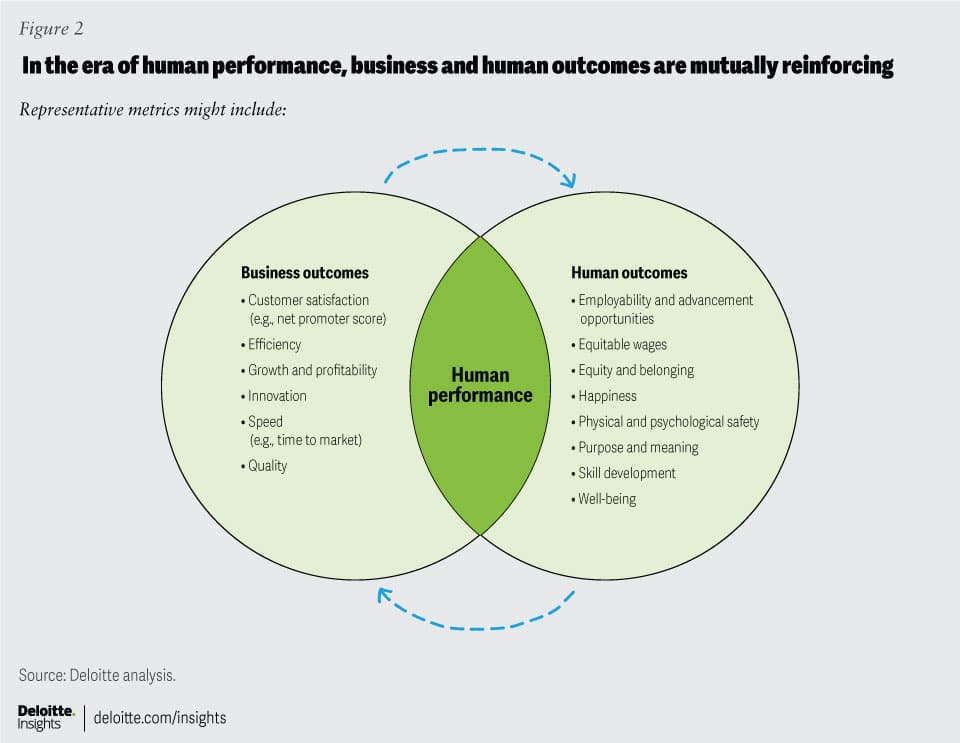[ad_1]
International analysts warn there can be fewer working-age folks within the coming years. For a lot of HR leaders, this information stings with a do-more-with-less name for productiveness. However this may not be dangerous information, with CHROs ready to affect the state of affairs positively. In response to a January report, McKinsey & Co. describes two doable eventualities with fewer of us within the workforce (one far more enticing than the opposite): financial stagnation or productivity-driven abundance.
Productiveness plus creativity
Josh Bersin, in a 2024 predictions piece, offered an analogous outlook, saying that C-suite leaders are being pressured to “hoard expertise, spend money on productiveness, and redevelop and redeploy folks for development.” The technique for fulfillment on this setting, as dubbed by Bersin, is The Productiveness Benefit: “When you will help your organization transfer sooner, you may reinvent sooner than your competitors.” Like many leaders within the enterprise world, Bersin additionally predicts that synthetic intelligence can be key to attaining productiveness.
In an period dominated by technological developments, adaptability and forward-thinking methods are in demand. In response to McKinsey, firms which are agile on this facet are “redefining” operational excellence, maximizing returns from each expertise and software program investments whereas fostering innovation to drive development.
McKinsey researchers level out that digital and AI transformations can extra carefully unite enterprise operations whereas additionally enhancing workforce expertise and empowering groups to innovate. This means that output may not come at the price of private creativity and success. Expertise can facilitate constructive outcomes for each the enterprise backside line and the wellbeing of the workforce, say the report’s authors, resulting in collective prosperity for the totality of the group.

From productiveness to human efficiency
In response to Deloitte, the once-straightforward correlation between particular person duties and tangible outcomes has change into blurred in right now’s complicated, collaborative setting. Conventional metrics—like hours labored or widgets produced—are not enough in measuring success, particularly with the rise of expertise and AI automating routine duties.
Ahead-thinking orgs received’t solely calculate success by standard measures like revenues and income, in line with Deloitte’s findings, but additionally think about the job satisfaction of people and groups. Deloitte identifies this shift as embracing a brand new paradigm centered round human efficiency, one which emphasizes the worth of things like worker happiness, wellbeing, psychological security, and development and improvement.
“New approaches can and will think about the employee as a human being, with a extra nuanced perspective on how they contribute to the group,” in line with Deloitte. Even in fields like logistics and manufacturing, the place productiveness indicators appear most related, automation can release the workforce for different targets, corresponding to growing “creativity, important pondering and collaboration” expertise, say the researchers.
The analysts level to the next alerts that reframing productiveness with a give attention to human efficiency could be proper to your group:
- There’s a slender give attention to output fairly than broader organizational outcomes
- Leaders really feel inundated by information and search to measure what really drives success
- Regardless of technological investments, conventional productiveness stays stagnant
- Staff have interaction in “productiveness theater” to look busy, however they really feel burnt out
If this feels like your workforce or office, you aren’t alone. When Deloitte surveyed 14,000 enterprise and HR leaders throughout many sectors in dozens of nations, solely 8% stated their group is main in using human efficiency metrics.
As instruments for capturing workforce information develop past conventional metrics like hours clocked or widgets made, HR groups are discovering options that measure collaboration, satisfaction, engagement and extra. For instance, community evaluation platforms give perception into how individuals are connecting with co-workers, serving to leaders uncover areas of threat and potential within the group.
Deloitte means that leveraging these new information sources empowers leaders to transition from merely assessing worker productiveness to evaluating general human efficiency. Due to a rush of innovation pushed by AI, a brand new class of HR tech instruments gives exponential capability for companies to gather, measure and analyze information. Supported by machine studying and human judgment, Deloitte’s researchers say HR groups are in a novel place to transform the information into actionable strategies.
[ad_2]
